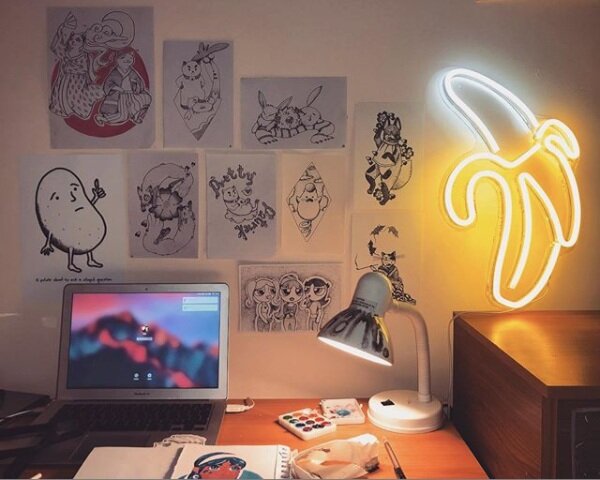Five Tips for Staying Focused at Home
When social distancing entered the public consciousness, we as responsible citizens took life-saving action and stayed home.
Staying home, though, sadly also meant that classes, proms, graduations, and end-of-year trips were canceled. Being a student is already difficult, and this new normal with none of the fun and all of the work is a hard reality to accept.
But together we can and will adapt. These uncertain times have made it difficult to get stuff done, and while we don’t have a magic wand to make it all go away, we do want to ease some of the stress you’re experiencing with a few tips on staying focused at home.
How to Stay Focused At School … Even When School is at Home
Tip #1: Define your workspace
Designate a space specifically for you to work (and your bed doesn’t count). Try finding a place that is comfortable to sit in for several hours and open to natural light. Creating this space may mean anything from:
Moving a few pieces of furniture around
Opening up your curtains
Putting an inspirational photo on your wall
Bonus points: Minimizing distractions as the best you can!
Research has found that clutter leads to stress and procrastination, so remember to keep your workspace tidy!
Tip #2: Set SMART goals
Start your morning by defining what you want to accomplish by the end of the day. If you reward yourself for completing specific tasks, these goals can also motivate you to study and help you draw the line on when to stop working.
Here’s an example of a SMART study goal. SMART is an acronym that stands for Specific, Measurable, Achievable, Relevant, and Timebound. Feel free to use this as a model and adjust it for your needs!
Specific: I want to improve my GPA so that I’m eligible for more scholarships next semester.
Measurable: I will earn a B or better in Algebra.
Achievable: I will meet with an UPchieve math coach once a week to help me identify my areas of growth.
Relevant: This will help me reach my full potential as a student.
Time-based: I have six weeks until midterms, which leaves enough time to meet with a tutor, complete a few problem sets, and decide if additional steps are necessary, such as reaching out to my teacher for additional support.
Tip #3: Stay active.
With very few reasons to leave the house, it’s tempting to become a human potato in sweats. While this may seem like it maximizes study or work time, usually you just end up burning yourself out.
Trying break up your day by incorporating mini-workouts at home. You can get a quick workout at home by exploring the many free resources available on YouTube. This one from Blogilates only requires you and a couch!
Tip #4: Create a routine and stick to it.
By repeating a schedule of tasks over a period of several days and weeks, you’re creating a habit that will require less and less mental effort to settle into. Over time, you’ll have trained your brain to focus at consistent times of the day.
Easier said than done, right? While this may be the most effective focusing tip, it also requires the most effort to achieve. Here are a few strategies we use when we’re trying to build a routine:
Bookend activities that you don’t want to do with things you love to do so that you have something to energize you and something to look forward to between tasks
Using a calendar, schedule time in advance for things that need to happen on a consistent basis, like studying for your SATs or taking your dog out for a walk
Break up daunting tasks into smaller activities throughout the day (or, if you prefer, attack the harder tasks first)
Write your day in checklist form. After each completed task, reward yourself with a 5-minute break
Build excitement for yourself! Get a pretty organizer, color code your day, start bullet journaling — make it fun!
Tip #5: Be gentle with yourself.
While studying from home may not be new for you, studying during a global health crisis definitely is. If you’re feeling stuck, stressed, and unproductive, put down the books, give yourself a moment to breathe, and come back when you’re ready.
Meditation can be a great tool to quiet the mind and reduce stress. Lucky for you, Calm and Headspace offer free resources. Here’s a meditation on letting go of stress that takes only one minute to do!
Additional Resources to Help You Focus
It’s always okay to ask for help. If you’re struggling with school, reach out to your teacher, guidance counselor, or an UPchieve coach for individualized support.
Looking for additional resources to help you succeed in school? Check out the following articles and you’ll be mastering academia in no time!



